Hostomel
Kyiv region, Ukraine
Rapid Assessment of Recovery Needs
Click here to go to the overall for the three towns.
Click here to go to the Irpin town report.
Click here to go to the Bucha town report.
INTRODUCTION
Hostomel urban-type village (hereafter - Hostomel) is a part of the Kyiv oblast (region) and the Bucha rayon (district), centre of Hostomel amalgamated community (hereafter - Hostomel community). Hostomel community includes the following administrative settlements: Hostomel, Ozera, Horenka, Moshchyn. (See Map from BBC).

Hostomel was one of main targets of Russian forces in the Kyiv region due to its important military and strategic infrastructure - specifically Hostomel Airport.
Hostomel was severely shelled and damaged. 4,500 buildings were damaged by Russian forces, which constituted approximately 30% of the settlement housing, including 2,800 households which as of mid-June have already reported their need for recovery aid (considering various types of damages, including fully destroyed buildings); more applications are anticipated as people continue to come back to their homes. The largest aircraft in the world AH-225 “Mriia” (The Dream), held in an aircraft hanger in Hostomel was also destroyed.
On March 7, the Mayor of Hostomel, while arranging delivery of humanitarian cargo for local inhabitants, was killed by Russian troops in the village. Russian soldiers bobby-trapped his body right after this, but agreed to clear explosive items to allow the local bishop to bury the killed Mayor. Amid these seriously challenging developments, and considering the necessity to continue a centralised legitimate governance in the settlement, Hostomel Local Military Administration (hereafter Local Military Administration) was established. Under its auspices, 5 humanitarian headquarters opened in Hostomel community (structurally branches of the Volunteer Centre of the Kyiv Region Military Administration).
Respondents report that since Hostomel is stable in terms of military threats, there is a need for support to revive the local economy to ensure employment normalisation and to redirect humanitarian aid for relief in Eastern regions of Ukraine where combat activities just ended or continue taking place.
Among all neighbouring communities, Hostomel possessed a high industrial potential. As of June 2022, 90% of entreprises where local inhabitants worked are destroyed. Airport and Glass Factory (two major taxpayers) are out of business, as are other actors of the local economy. Currently the Local Military Administration is negotiating with businesses to remain in Hostomel, restore their infrastructure and renew operations, but they recognize that as long as the war is still ongoing all rebuilding processes are problematic.
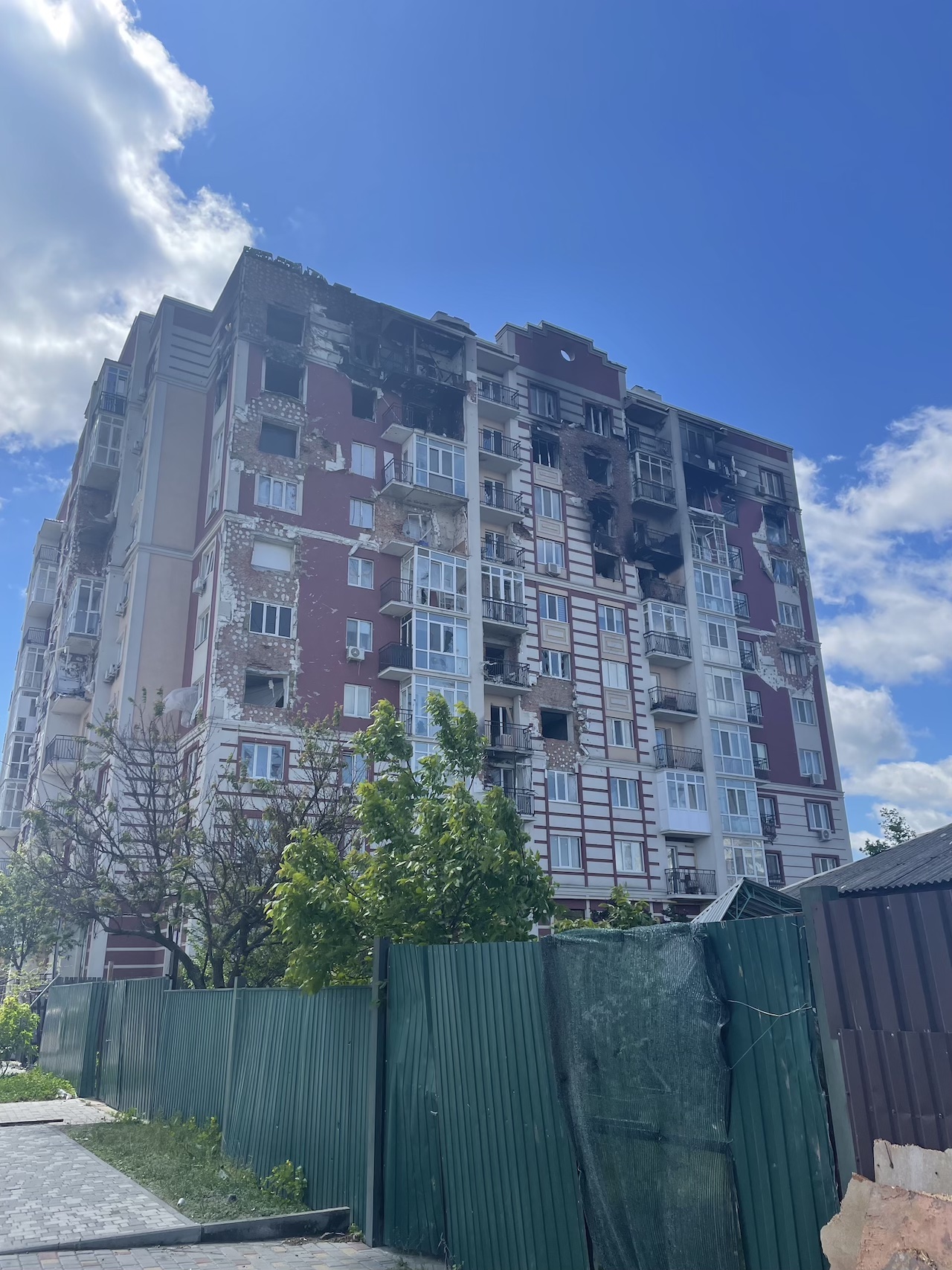
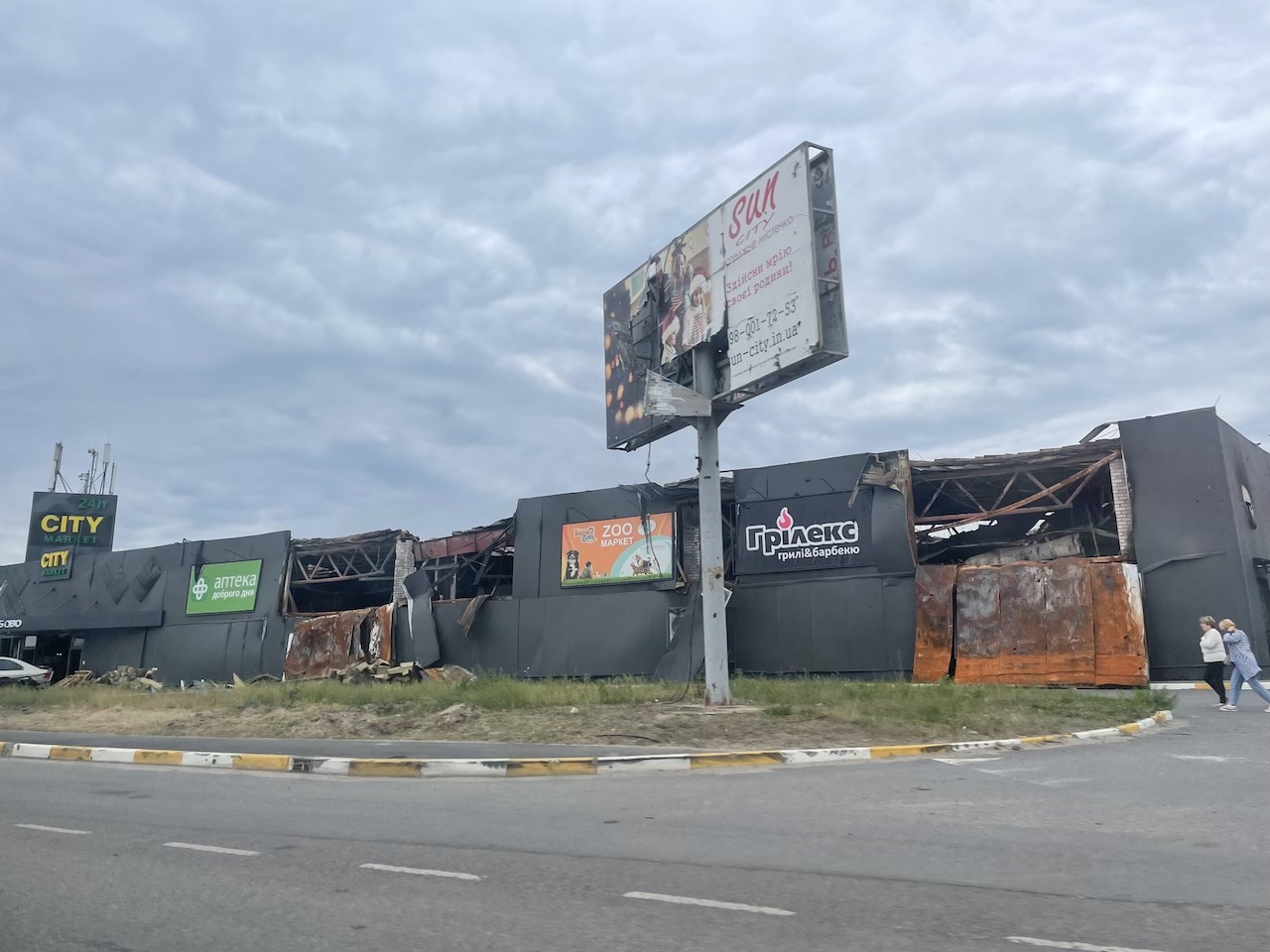
The following section is dedicated to a detailed analysis of current challenges and post-occupation needs of Hostomel community, based on the perspective of regional and local authorities and agencies, business representatives, civil society, and religious community inputs Their contributions were obtained through nine comprehensive structured interviews in formal discussions (resulting in more than 4.6 hours of recorded interviews).
CORE CHALLENGES AND NEEDS IDENTIFIED
In terms of post-occupation recovery concerns, the following categories were mentioned as top priority ones (each respondent was prompted to identify multiple priorities). With nine respondents, each point stands for one respondent who prioritised that category of needs. More detailed response rate is shown in Chart #1.
Chart #1: Priority Needs Identified

Categories not identified as priority needs by any respondent, implying that these issues are already resolved to a high extent: security - personal safety, and legal aid (free primary aid).
With regard to the prioritised categories and groups of categories, respondents reported the following more detailed state of affairs:
HOUSING
As inhabitants register their requests for restoration aid considering diverse types of damages, as of mid-June, 1,500 people are registered as homeless and report urgent need for temporary housing. More than 80% of inhabited buildings in Hostomel were private houses. People are motivated to rebuild their own homes rather than opt for temporary housing in modular houses. Nonetheless, modular houses for private households (1-family unit) with availability for connection to existing (if operational) utilities infrastructure is the strategy selected to ensure temporary housing in the area before capital restoration is completed.
The main issue for the state-provided aid for housing is reportedly low speed of examination of damages. Current Commission on examination of damages focuses on partial (non-critical) restoration needs, and assessments for capital restoration rebuilding will start later. In addition to this, respondents specifically outlined a need to attract more expert housing designers and engineers to support local rebuilding efforts. Such experts, they mentioned, are widely available throughout the Kyiv region and locally.
Already a big group of supporters provide materials for restoration, equipment and items of first household needs to replace what was damaged or stolen by Russian occupiers: Mattresses, blankets, utensils, hygiene packages, water storage tanks - provided by UN missions and Ukraine Orthodox Church. Work on rebuilding is underway, but its scale is currently limited, and Hostomel would benefit from further help, as losses of local inhabitants and business are extremely high.
According to respondents, given these developments, further support should be aimed at:
- delivery of household utensils, linens, and other items of domestic usage,
- establishment of temporary housing for inhabitants in urgent need (considering formula of individual modular houses when people possess private land already and utilities infrastructure there),
- engagement of qualified experts, designers and engineers for evaluation of damages, drafting of technical documentation and reconstruction plans,
- minor restoration in terms of supply of tools, materials and funds for roofs / windows / doors / internal housing utilities systems / furniture purchase or repairment, and
- capital restoration of existing buildings (private housing, public infrastructure buildings, objects of critical infrastructure, regional units of state emergency services).
For this category of needs, the following actors reportedly provide aid: Central (national) Government, State Emergency Service, Local Military Administration and Authorities, Private Business from Ukraine and abroad, the International Committee of the Red Cross, United Nations, Promoters and Patrons (personalities), Volunteers, Churches (religious communities).
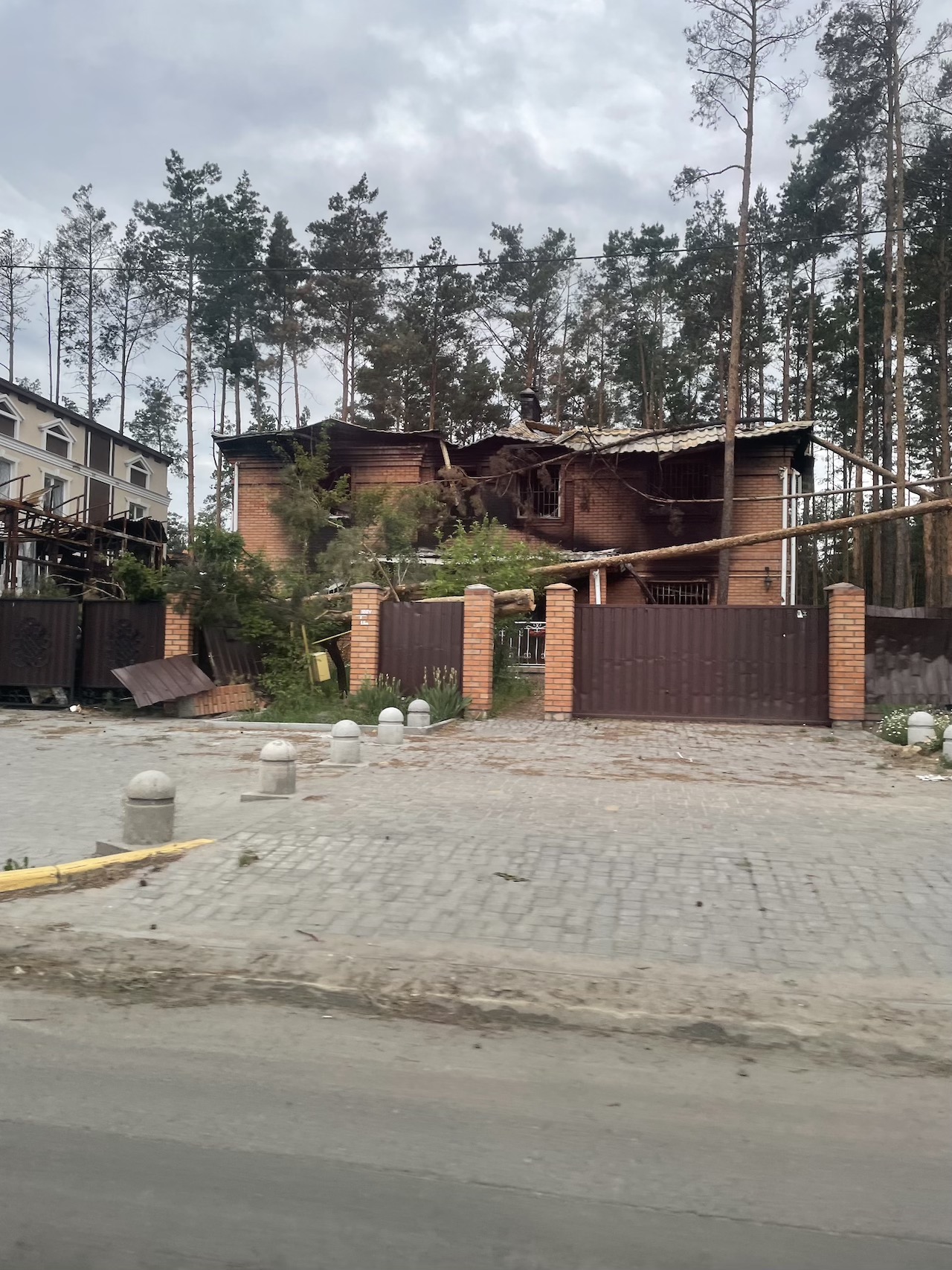
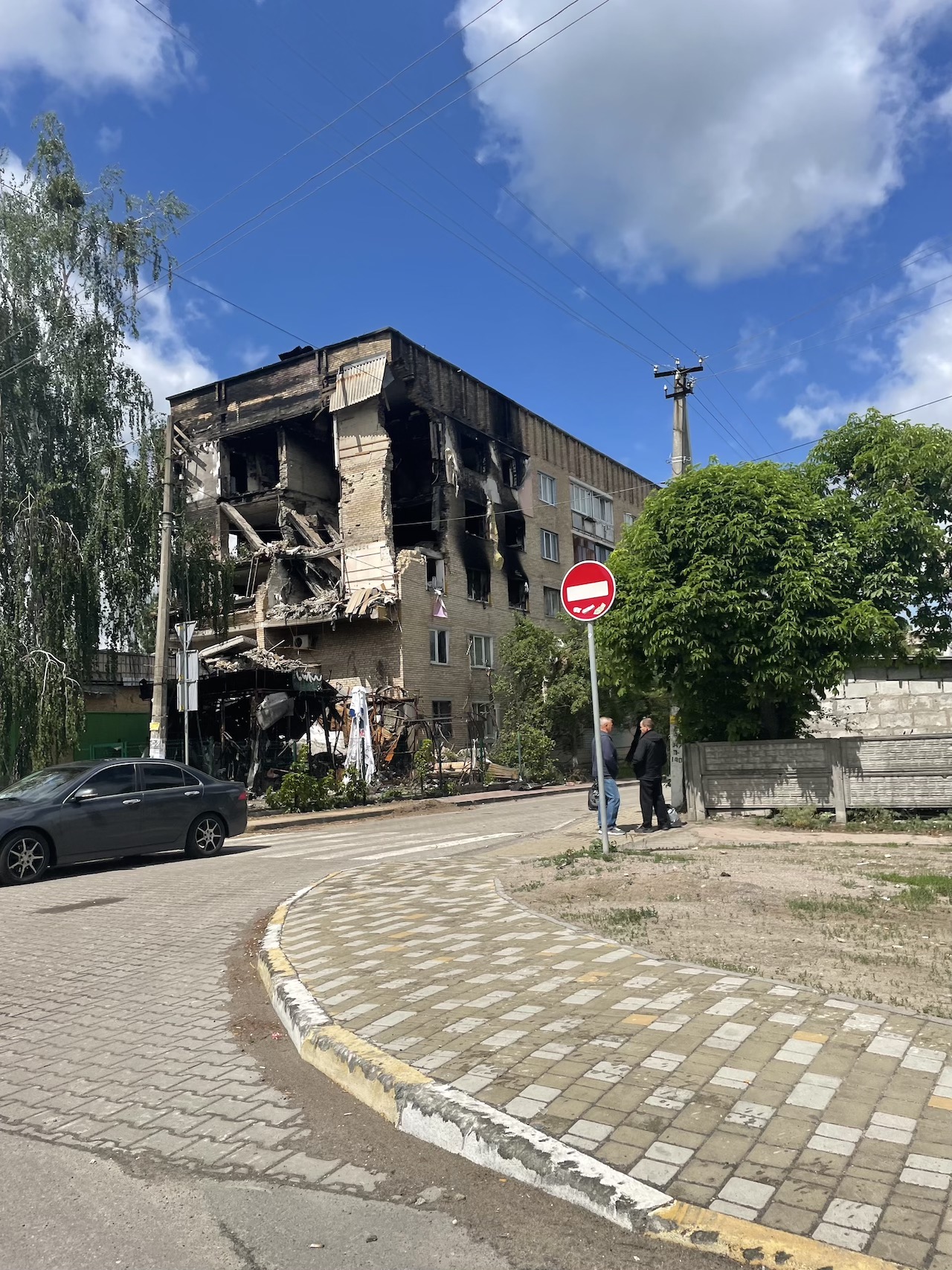
UXO / LANDMINES (HUMANITARIAN DEMINING)
As reported by the State Emergency Service (Kyiv region headquarters), as of 7 June, 98% of public areas in temporarily occupied and now liberated inhabited settlements (i.e. municipal and critical infrastructure, common areas, highways and main roads) have been cleared of explosive remnants; multi-storey apartment buildings and private homes have been cleared upon owners’ requests. Safety of the local population was supported by the call by local mayors for the local population to not come back before general demining actions were completed. Damaged housing is inspected for explosive risks upon owners’ request, as people return. Additionally, there is a need for further humanitarian demining actions for such areas as forests and forest belts, parks and agricultural areas. Full clearance of all areas is likely to require several years, once the war has ended.
According to respondents, given these developments, further support should be aimed at:
- purchase of sapper equipment and personal protection items (ballistic helmets and vests) for servicemen and servicewomen of Emergency Services and Armed Forces,
- purchase of explosive-protected vehicles for demining missions and operations,
- educational materials, information sessions and lessons for local inhabitants concerning the rules of safe behaviour in areas with suspected explosive objects.
For this category of needs, the following actors reportedly provide aid: State Emergency Service (as main responsible agency at the national level), governments of Poland, Austria, United Kingdom, Ukrainian business, and Non-specified International Organisations, Local Authorities.
INCOME SITUATION
Most people who come back to Hostomel have nowhere to work / earn regular income. Reportedly, only 20% of the local population who have returned to the area can ensure all their basic needs themselves. Industrial production, private sector services and commerce all suffered greatly. Entrepreneurs report major losses: equipment destroyed or stolen by occupiers, technologies and automation not available, buildings not yet restored. Tech companies, warehouses, centres of logistics, shopping malls and big supermarkets are all severely affected by shelling and missile strikes. Hence, many entreprises are not convinced that it would be realistic to relaunch their business in the area.
According to respondents, given these developments, further support should be aimed at:
- granting support for private entrepreneurs to restore their activity,
- affordable credits for business to restart production and ensure jobs in the settlement,
- aid to attract local and regional force for repair, i.e. engineers, constructors,
- providing materials and equipment.
DIIA Business Bucha, and the Local Military Administration serve as contact points for businesses to share their inquiries. Certain aid for the category was also provided by the state. Still, very limited aid was reported as available for this category of needs currently. At the same time, thematic foundations and support programs continue to emerge both in Ukraine and worldwide.
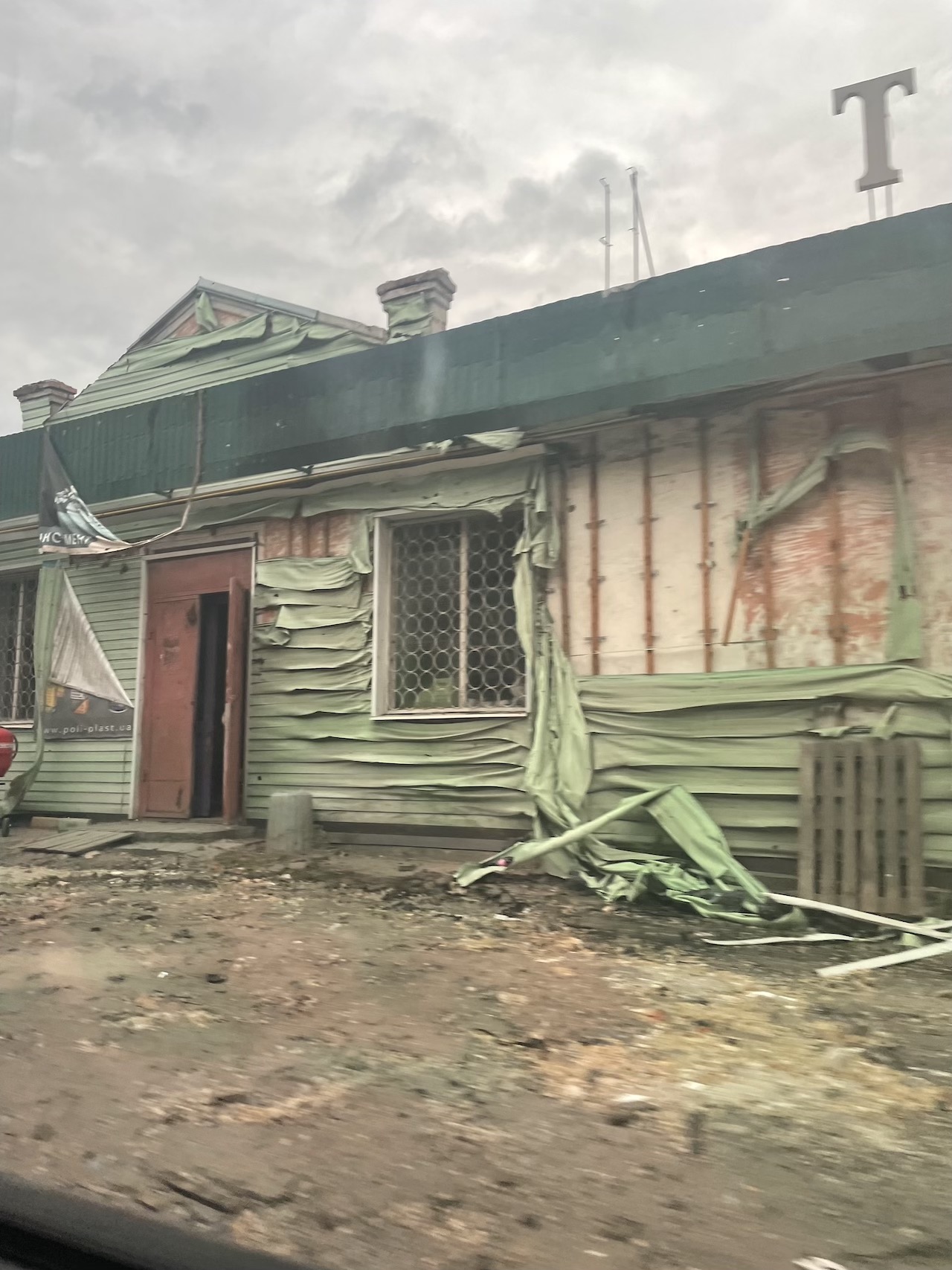
HEALTH SERVICES
100% of medical infrastructure in Hostomel was affected by occupation - either damaged partially or totally destroyed. Respondents outlined that before the Russian invasion, only primary healthcare was available in the settlement. Several mobile clinics were eliminated by missile strikes and shelling, several are affected, and only one is operational now with support of Doctors without Borders. All basic medicines are provided without cost to patients.
According to respondents, given these developments, further support should be aimed at:
- supporting emotional resilience and psychological health (of both inhabitants and security sector workers),
- opening pharmacies and mobile clinics,
- restoration of buildings and other infrastructure of healthcare establishments.
For this category of needs, the following actors reportedly provide aid: Central (Ministry of Healthcare), Department of Healthcare of Kyiv Region Military Administration, Local Authorities, Doctors without Borders, Producers of Medical Goods, Local Foundations and Organisations.
FOOD AVAILABILITY / SUPERMARKETS AVAILABLE AND OPEN
Food assistance is widely commented by respondents, as diverse groups of issues are impacting food availability and relaunching of retail work. Reportedly, all big shops and malls were destroyed. Three small grocery stores and an open air market are gradually restoring their work. Basic food is available in Hostome. Five humanitarian headquarters operate in Hostomel community, supporting the village and adjacent settlements, with assistance of civil society organisations. Starting June 1, food aid is being provided as targeted assistance for selected vulnerable categories (list of categories is set by the Social Department of Administration). People do not always possess documents to confirm their affiliation with those identified groups, as many of them lost their documents in damaged / burned-out houses or can not obtain confirming papers due to different reasons. As there are 4 settlements in Hostomel community, and not everywhere food shops restarted their work, the allocated assistance will go to those villages where food is still not available for purchase.
Long queues usually form in anticipation of aid delivery. People with disabilities (up to 200 of those who required special assistance) are most challenged by logistics of aid delivery. Food is provided in modest quantity, and perishable items reported are sometimes already bad.
According to respondents, given these developments, further support should be aimed at:
- food packages (especially, non-perishable products),
- restoration of buildings where supermarkets are / were situated,
- enhanced support for vulnerable categories of people.
For this category of needs, the following actors reportedly provide aid: Government of Ukraine, Kyiv Region Volunteers Centre, Local Authorities, Volunteers and Charitable Foundations (from other regions of Ukraine, and from Spain, Poland, Germany), Private business and donors from Ukraine, Israel, Georgia, Latvia and other EU countries, International Committee of the Red Cross, Rinat Akhmetov Foundation.
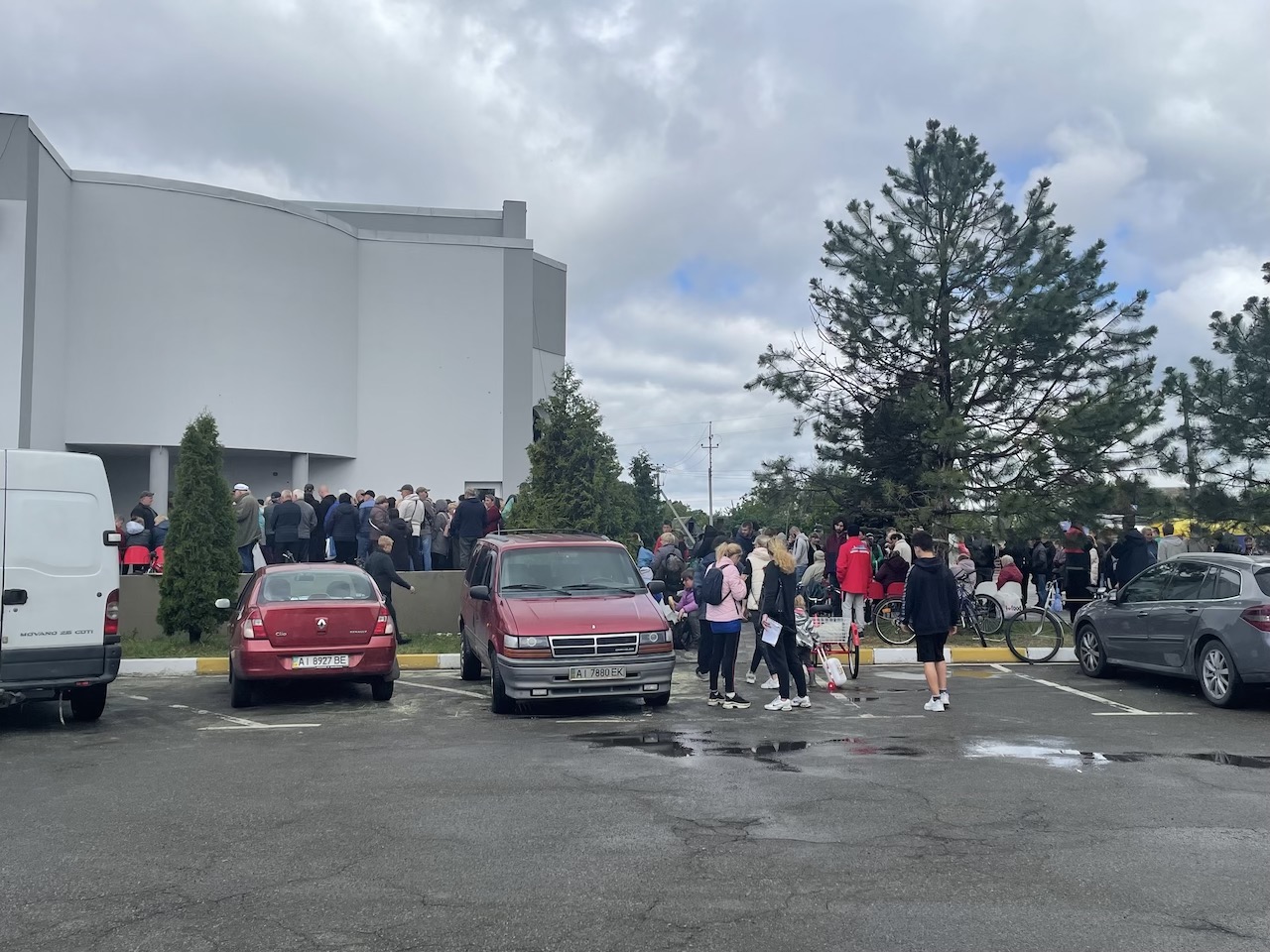
EDUCATION SERVICES
Almost 100% of educational infrastructure is affected by missile strikes, shelling or fires; educational establishments properties were heavily looted and several were totally destroyed. Schools lost all their equipment. 14 educational establishments operated in the settlement prior to the invasion. Currently, all schools work online. Among core needs, respondents mentioned rebuilding of educational infrastructure and purchasing equipment, computers, materials.
RUBBLE REMOVAL / GARBAGE COLLECTION
During the occupation, Russian forces totally ruined urban heavy equipment and facilities. Currently, major rubble is being cleared by national and local agencies. There is continuing need to support private companies and households in this regard (by purchasing or renting equipment, specialised heavy vehicles, tall cranes, petroleum, and inviting more specialists to conduct the works). In addition to this, garbage collection is a challenging aspect of urban life in the area, as the majority of vehicles and equipment was destroyed. Hence, Hostomel needs garbage trucks for permanent use (purchase). As local authorities collect and regularly update the list of needs under this category, they announced readiness to provide specified information upon request.
For this category of needs, the following actors reportedly provide aid: State Emergency Service, Kyiv City and Region Entities, Donors, Neighbouring Communities, Local Authorities, ongoing negotiations with Red Cross regarding providing of special utility vehicles.
WIFI / INTERNET / MOBILE PHONE SERVICES
Currently, mobile operators and central authorities provide aid in the restoration of this type of infrastructure, but further support would also be valuable. For this group of needs, respondents reported necessity to repair mobile connection infrastructure (i.e. highway cables, towers), and purchase user equipment, as most phones and computers in the settlement were stolen or destroyed by Russian troops during days of occupation.
WATER / ELECTRICITY
Major aid in restoring water supply (along with drainage and sewerage) local systems was provided by the International Committee of the Red Cross and other international donors in the first days right after the liberation of Bucha rayon. A joint project on water supply restoration engaged Irpin, Bucha, Hostomel and Borodyanka, lasting 18 days. As of April 28, water supply had been ensured to Irpin community, from where water pipeline restoration spread to other settlements. Electricity is functioning in almost the entire territory of Hostomel, but is unreliable, and is not yet available/repaired in some of the nearby villages.
According to respondents, given these developments, further support should be aimed at:
- further evaluation and capital repair of water supply, drainage, sewerage, electricity, and heating systems of the settlements (as more people come back to their households and pressure on the systems increases, new issues may arise due to technical inability to identify such problems under earlier circumstances),
- funding of capital restoration of water treatment (aeration) systems in the region aiming at better ecological conditions and resiliency,
- solving the issue of repair of powerline towers, which do not belong to local entities (as these objects do not belong to Local Administration and / or urban companies formally, local budget can not be spent on repairment of such infrastructure),
- restore electricity in Moshchyn and other neighbouring villages.
For this category of needs, the following actors reportedly provide aid: UNICEF, ICRC, ACTED, Volunteers and Business, Local Authorities, Public Utility Companies, D.TEC Group Enterprises.
ACCESS TO INFORMATION
Most requests of local Hostomel community members are for information regarding humanitarian assistance (food and other humanitarian relief). Representatives of social service agencies provide the required information, and some details are usually available online (Local Military Administration social media pages). People-to-people contacts play a big role in dissemination of important information. Actual need was expressed for purchase of equipment (mobile phones and computers) as almost all possessions of local council, administrations and services were destroyed or looted during the occupation period.
STATE-PROVIDED ADMINISTRATIVE SERVICES
For this category of needs, a wide range of services were considered, including state registration procedures and social services. Respondents reported challenges with obtaining documents to confirm attribution to diverse social groups (to get targeted aid). Another aspect is a challenging procedure to obtain prescribed financial state-provided aid. Even though many services are available online, many people applied to financial assistance months ago, and still do not know what they might do to either claim further implementation of such state service, or obtain information about their “place” in the que of those who anticipate financial aid. At the same time, the Prime-Minister of Ukraine reported in April that work was underway to solve the issue.
CONCLUSIONS & KEY OBSERVATIONS
In the case of Hostomel, some problems were reported with different frequency than in other towns covered. This suggests the need for assistance which is both comprehensive and able to respond to differences in local situations. In this precise case, concentration of defence and military infrastructure in the settlement contributed to the Russian attack and to the high level of serious damage for the entire settlement. In this context, a special Working Group on Hostomel Restoration was established at the Kyiv region level.
At the time of the Rapid Needs Assessment, Hostomel still had considerable need for humanitarian relief. Restoration needs change depending on the phase of relief delivery. Even though the entire list of necessities is wide and multi-layered, five central priorities outline core areas of attention for post-occupation recovery at this stage of development - housing, UXO / landmines, income situation in the area, health services, and food availability (the latter is closely linked with employment issue).
One of main challenges is the absence of free access to gasoline and petroleum throughout the entire territory of Ukraine, which consequently reduces speed of envisioned activities, logistics and repairs, and raises costs of any potential aid. Not all respondents mentioned this aspect as it became a general knowledge in Ukraine, usually implied by default.
According to the key informants interviewed, at the very beginning of the deoccupation period international organisations (UN and INGO) provided assistance directly to local communities. Since then, nearly all assistance goes through national emergency response organisations, churches and the Humanitarian Hubs established by local councils, and from there to those in need of assistance.
Local networks and authorities have proven to be best situated and equipped to collect, operate and spread the word about the urgent needs of their communities. The Hostomel Local Military Administration reports its openness for cooperation, and readiness to provide tailored list of restoration needs upon request.
Rather than importing supplies to respond to local needs, in most cases it is possible (and desirable) to solve problems with locally available supplies. Majority of products, goods and services required for effective and efficient post-occupation recovery are available on Ukrainian markets in other regions and cities. Purchasing locally in Ukraine would also support the business environment and national economy.
While the war is still on, any type of post-occupation restoration is rather complicated to orchestrate and conduct. Nonetheless, local inhabitants express a strong desire to return to normal life as soon as possible, a readiness to restore their houses, and to return to any available jobs. Continuing assistance for the needs identified in this report will provide an important contribution to immediate and medium-term recovery. Respondents expressed their willingness to be contacted regarding potential support; contact information may be requested from RMTeam International ([email protected]).